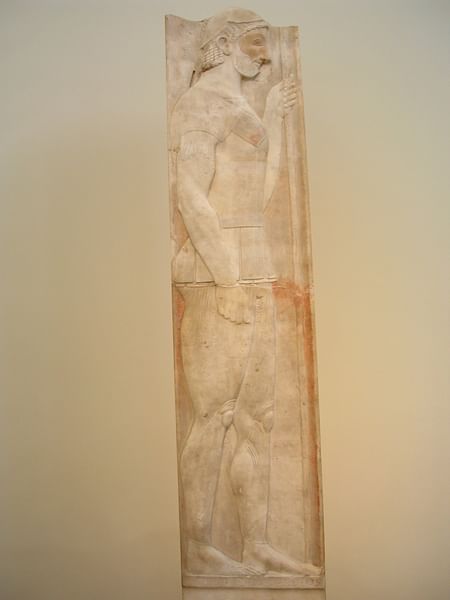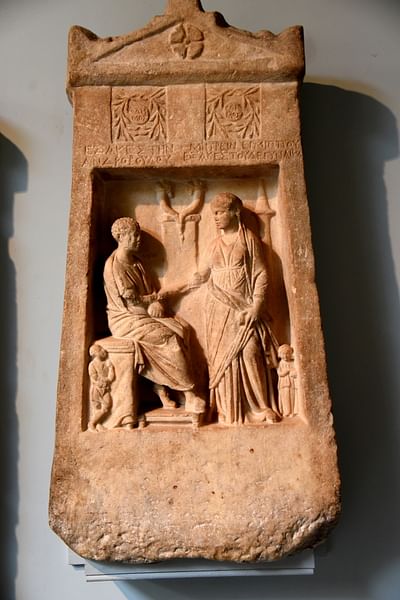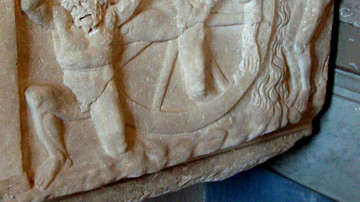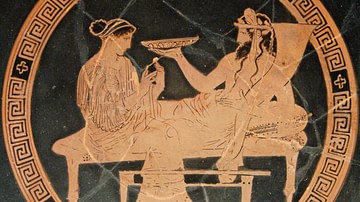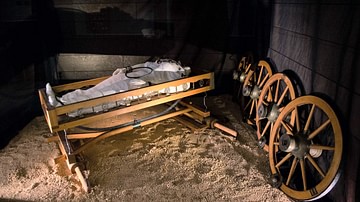In ancient Greece the continued existence of the dead depended on their constant remembrance by the living. It was understood that the soul lived on after bodily death in the realm known as Hades; but that land had different regions the soul might fly to depending on the deeds done in life and, also, how the living remembered them.
The after-life, for the ancient Greeks, consisted of a grey and dreary world in the time of Homer (8th century BCE) and is depicted, most famously, in the scene from Book 11 of Homer's Odyssey in which Odysseus meets the spirit of the great warrior Achilles in the nether-world where Achilles tells him he would rather be a landless slave on earth than a king in the underworld. By the time of Plato, however (4th century BCE) the after-life had changed in character so that souls were better rewarded for their pains once they had left the earth; but only in so much as the living kept their memory alive.
The Land of the Dead
The afterlife was known as Hades and was a grey world ruled by Hades, the Lord of the Dead, and his queen Persephone. Within this misty realm, however, were different planes of existence the dead could inhabit. If they had lived a good life, and were remembered well by the living, they could enjoy the sunny pleasures of the Plain of Asphodel (Aspodel Meadows); if they had been warriors who died bravely in battle then they went to Elysium; if they were wicked then they fell into the darker pits of Tartarus where they were punished while, if they were forgotten, they wandered eternally in the blackness of Tartarus. While Asphodel, Elysium, and Tartarus existed in the time of the writer Hesiod (contemporary of Homer) - as well as the Isles of the Blessed where the spirits pure in heart lived - they were not understood then in the same way they came to be.
In Plato's dialogue of the Phaedo, Socrates delineates the various plateaus of the after-life and makes it clear that the soul who, in life, devotes itself to the Good is rewarded in the beyond with a much more pleasant existence than those who indulged their appetites and lived only for the pleasures the world has to offer. This was always the case, long before Plato's time (4th century BCE), although he added a philosophical flourish to the vision but, overall, the depiction of the collective dead was of a large group of dismal, unpleasant, individuals, disappointed in their final fate and yearning for what had been lost.
It is likely that many of the dead felt the same way when they lived - thinking only of the past and wishing for what they could not have - but this is not how the living were encouraged to remember them. It was, in fact, considered one's duty to the dead to remember them well, regardless of the life they had lived, the mistakes they had made, and, thereby, provide them with continued existence in Asphodel and, in time, Elysium. This remembrance was not considered a matter of personal choice but, rather, an important part of what the Greeks knew as eusebia.
In dealing with the spirits of the departed, eusebia took the form of observing proper burial practices, providing the deceased with food and drink offerings, and erecting a proper memorial in their honor. One's tomb or tombstone might depict one's likeness, or an especially dear memory, or some verse but, whatever appeared on one's grave marker, it was there to remind the living of who was interred there and what honors were due them.
Piety in Ancient Greece
The Greek word eusebia is usually translated into English as `piety' but eusebia was much more than that: it was one's duty to oneself, others, and the gods which kept society on track and made clear one's place in the community. Socrates, for example, was executed by the city-state of Athens after having been convicted of impiety for allegedly corrupting the youth of Athens and speaking against the established gods. However unjust one may see Socrates' end today he would, in fact, have been guilty of impiety in that he encouraged the youth of Athens, by his own example, to question their elders and social superiors. This behavior would have been considered impious in that the youth were not acting in accordance with eusebia, i.e. they were forgetting their place and obligations in society.
Eusebia & the After-life
In the same way that one had to remember one's duty toward others in one's life, one also had to remember one's duty to those who had departed life. If one forgot to honor and remember the dead, one was considered impious and, while this particular breach of social conduct was not punished as severely as Socrates', it was certainly frowned upon severely. Many of the tombstones of the ancient Greeks - whether in a museum or just below the Acropolis in Athens or elsewhere - depict comfortable, common scenes: a husband sitting at table as his wife brings him his evening meal, a man being greeted by his dogs upon returning home.
These simple scenes were not merely depictions of moments the deceased enjoyed in life; they were meant to remind the living viscerally of who that person was had been, of who that person still was now in death, and to spark the light of continued remembrance in order that the `dead' should live in bliss eternally. In ancient Greece, death was defeated, not by the gods, but by the human agency of memory.
